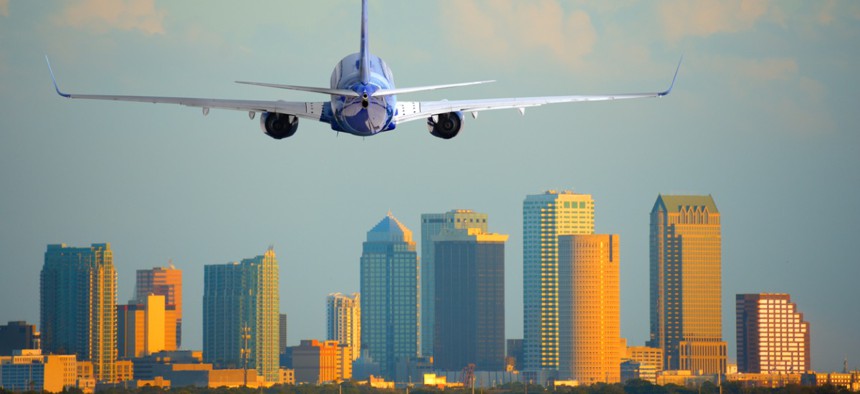Airlines Ask For ‘Immediate Intervention’ in 5G Deployment, Citing Safety Issues

mokee81/istockphoto
An airlines advocacy group asked the Biden administration to implement more protection around select airport towers in a continuation of the 5G rollout debate.
The row between telecommunications giants Verizon and AT&T and several federal entities continued this week after an airlines advocacy group asked the Biden administration for another delay in the 5G rollout, citing continued fears over aircraft communications interruptions.
In response to the ongoing debacle, President Joe Biden issued a statement on Tuesday, thanking Verizon and AT&T for their continued cooperation in augmenting their rollout plans.
“I want to thank Verizon and AT&T for agreeing to delay 5G deployment around key airports and to continue working with the Department of Transportation on safe 5G deployment at this limited set of locations,” he wrote. “This agreement protects flight safety and allows aviation operations to continue without significant disruption and will bring more high-speed internet options to millions of Americans.”
Biden weighed in again on the issue following a letter released on Monday by Airline for America that requests that the nationwide 5G C-band rollout––set for Jan. 19––be excluded from within two miles of airport runways at affected airports.
“Immediate intervention is needed to avoid significant operational disruption to air passengers, shippers, supply chain and delivery of needed medical supplies,” the letter reads.
The group noted that the impact from the 5G rollout is “substantially worse” than officials previously anticipated. The issue stems from 5G’s potential interference with airplane altimeters, a key device that is especially important when aircraft are near the ground and landing. .
“Given the short time frame and the exigency of this completely avoidable economic calamity, we respectfully request you support and take whatever action necessary to ensure that 5G is deployed except when towers are too close to airport runways until the FAA can determine how that can be safely accomplished without catastrophic disruption,” the group requests.
This crux was the original motive for Transportation Secretary Pete Buttigieg and Federal Aviation Administrator Steve Dickson to request Verizon and AT&T delay their 5G C-band rollout in early January. After a heated back-and-forth, the telecommunications companies agreed to a delay, but the issue of how 5G affects altimeters is still being studied.
Signatories on the new letter include chief executives from Hawaiian Airlines, American Airlines, JetBlue Airways, Southwest Airlines, and UPS Airlines.
The latest interruption to the 5G rollout drew more ire from the private sector. AT&T responded by saying its leaders were “frustrated” with the FAA’s continued delays in spite of the safety measures both AT&T and Verizon have already agreed to.
“At our sole discretion we have voluntarily agreed to temporarily defer turning on a limited number of towers around certain airport runways as we continue to work with the aviation industry and the FAA to provide further information about our 5G deployment, since they have not utilized the two years they’ve had to responsibly plan for this deployment,” an AT&T spokesperson said. “We are launching our advanced 5G services everywhere else as planned with the temporary exception of this limited number of towers.”
Included in the debate is the Federal Communications Commission, whose leadership sided with the telecommunications companies. Commissioner Brendan Carr said the agency’s previous analysis concluded the forthcoming C-band network would not interfere with flight altimeters in early January.
In a more recent statement, fellow FCC Chairwoman Jessica Rosenworcel struck a different tone and applauded the agreement between parties that would promote safety and high speed internet.
“This is welcome news because we know that deployment can safely co-exist with aviation technologies in the United States, just as it does in other countries around the world,” she wrote.
On the FAA’s end, officials released several statements ahead of the Jan. 19 rollout, confirming the agency’s review of altimeter data and clearing some flights as being able to land alongside 5G deployment.
"We recognize the economic importance of expanding 5G, and we appreciate the wireless companies working with us to protect the flying public and the country’s supply chain,” Buttigieg wrote in the latest statement. “The complex U.S. airspace leads the world in safety because of our high standards for aviation, and we will maintain this commitment as wireless companies deploy 5G."






